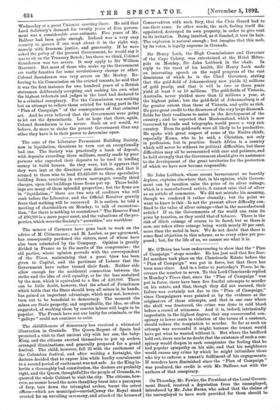The childlikeness of democracy has received a whimsical illustration in
Granada. The Queen-Regent of Spain had promised a visit to that ancient city with her son, the baby- King, and the citizens exerted themselves to put up arches, arranged illuminations, and generally prepared for a grand festival. The child, however, fell ill with the excitement of the Columbus festival, and after waiting a fortnight, the doctors decided that to expose him while hardly convalescent to a second period of excitement was not safe. As the King in- herits a thoroughly bad constitution, the doctors are probably right, and the Queen, thoughtful:for the people of Granada, re- quested the whole Cabinet to visit the city. The citizens, how- ever, no sooner heard the news than they burst into a paroxysm of fury, tore down the triumphal arches, burnt the octroi offices—which are municipal—carried:away the Royal stand erected for an unveiling ceremony, and attacked the houses of
Conservatives with such fury, that the Civic Guard had to use their arms. In other words, the mob, feeling itself dis- appointed, destroyed its own property, in order to give vent to its irritation. Being insulted, as it fancied, it tore its hair. The explosion is natural enough ; but imagine that this mob, by its votes, is legally supreme in Granada.






















































 Previous page
Previous page